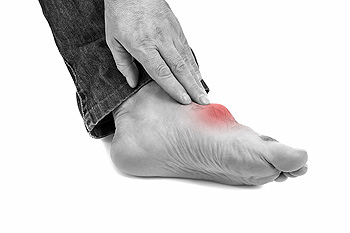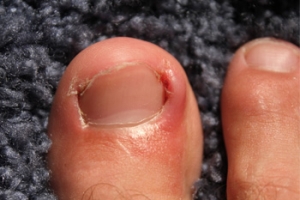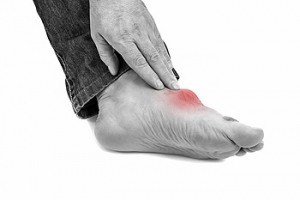Garner (919) 661-4150
Treating Ingrown Toenails
 Ingrown toenails can be both uncomfortable and painful if left untreated. One of the most common causes of their development is hereditary or genetic factors. The curvature of your toenails are passed down to you, so if you have family members that are prone to getting ingrown toenails, it is likely you may run the same risk. Cutting your toenails too short is another cause of getting an ingrown toenail. If they are cut too short, the skin around the toe will adapt, forming an ingrown toenail. It is also advised you do not cut your toenails on an angle, rather trim them straight across. If you are experiencing pain, a podiatrist may suggest a splint to help stop the nail from growing any further into your skin. In more severe cases, a podiatrist may suggest surgery and full removal of the toenail. To help ease the pain, it’s recommended that you soak your feet in epsom salt, as this will also help to get rid of any bacteria under the toenails. For professional care we recommend you consult with a podiatrist who can advise you on the best course of treatment for your case.
Ingrown toenails can be both uncomfortable and painful if left untreated. One of the most common causes of their development is hereditary or genetic factors. The curvature of your toenails are passed down to you, so if you have family members that are prone to getting ingrown toenails, it is likely you may run the same risk. Cutting your toenails too short is another cause of getting an ingrown toenail. If they are cut too short, the skin around the toe will adapt, forming an ingrown toenail. It is also advised you do not cut your toenails on an angle, rather trim them straight across. If you are experiencing pain, a podiatrist may suggest a splint to help stop the nail from growing any further into your skin. In more severe cases, a podiatrist may suggest surgery and full removal of the toenail. To help ease the pain, it’s recommended that you soak your feet in epsom salt, as this will also help to get rid of any bacteria under the toenails. For professional care we recommend you consult with a podiatrist who can advise you on the best course of treatment for your case.
Ingrown toenails can become painful if they are not treated properly. For more information about ingrown toenails, contact Chukwuma Ukata, DPM of Advanced Carolina Foot and Ankle Center. Our doctor can provide the care you need to keep you pain-free and on your feet.
Ingrown Toenails
Ingrown toenails occur when a toenail grows sideways into the bed of the nail, causing pain, swelling, and possibly infection.
Causes
- Bacterial infections
- Improper nail cutting such as cutting it too short or not straight across
- Trauma to the toe, such as stubbing, which causes the nail to grow back irregularly
- Ill-fitting shoes that bunch the toes too close together
- Genetic predisposition
Prevention
Because ingrown toenails are not something found outside of shoe-wearing cultures, going barefoot as often as possible will decrease the likeliness of developing ingrown toenails. Wearing proper fitting shoes and using proper cutting techniques will also help decrease your risk of developing ingrown toenails.
Treatment
Ingrown toenails are a very treatable foot condition. In minor cases, soaking the affected area in salt or antibacterial soaps will not only help with the ingrown nail itself, but also help prevent any infections from occurring. In more severe cases, surgery is an option. In either case, speaking to your podiatrist about this condition will help you get a better understanding of specific treatment options that are right for you.
If you have any questions please feel free to contact our office located in Garner, NC . We offer the newest diagnostic and treatment technologies for all your foot and ankle needs.
Why Does Plantar Fasciitis Occur?
 A common foot condition that affects numerous patients is referred to as plantar fasciitis. This occurs when the tissue that is located on the bottom of the foot becomes inflamed. This condition focuses on the plantar fascia, which connects the toes to the heels. The arch is supported by this band of tissue, and can be affected as this condition progresses. There are common reasons why plantar fasciitis may gradually develop. These can consist of standing for the majority of the day, existing foot conditions that may include having a rigid Achilles tendon, and wearing shoes that do not fit correctly. Patients may find moderate relief when the affected foot is elevated. It may also be beneficial to perform exercises that can strengthen the overall foot. Additionally, it may help to tape the foot which can provide support. If you feel you have this ailment, it is suggested that you schedule a consultation with a podiatrist who can help you to manage this condition.
A common foot condition that affects numerous patients is referred to as plantar fasciitis. This occurs when the tissue that is located on the bottom of the foot becomes inflamed. This condition focuses on the plantar fascia, which connects the toes to the heels. The arch is supported by this band of tissue, and can be affected as this condition progresses. There are common reasons why plantar fasciitis may gradually develop. These can consist of standing for the majority of the day, existing foot conditions that may include having a rigid Achilles tendon, and wearing shoes that do not fit correctly. Patients may find moderate relief when the affected foot is elevated. It may also be beneficial to perform exercises that can strengthen the overall foot. Additionally, it may help to tape the foot which can provide support. If you feel you have this ailment, it is suggested that you schedule a consultation with a podiatrist who can help you to manage this condition.
Plantar fasciitis can be very painful and inconvenient. If you are experiencing heel pain or symptoms of plantar fasciitis, contact Chukwuma Ukata, DPM from Advanced Carolina Foot and Ankle Center. Our doctor can provide the care you need to keep you pain-free and on your feet.
What Is Plantar Fasciitis?
Plantar fasciitis is the inflammation of the thick band of tissue that runs along the bottom of your foot, known as the plantar fascia, and causes mild to severe heel pain.
What Causes Plantar Fasciitis?
- Excessive running
- Non-supportive shoes
- Overpronation
- Repeated stretching and tearing of the plantar fascia
How Can It Be Treated?
- Conservative measures – anti-inflammatories, ice packs, stretching exercises, physical therapy, orthotic devices
- Shockwave therapy – sound waves are sent to the affected area to facilitate healing and are usually used for chronic cases of plantar fasciitis
- Surgery – usually only used as a last resort when all else fails. The plantar fascia can be surgically detached from the heel
While very treatable, plantar fasciitis is definitely not something that should be ignored. Especially in severe cases, speaking to your doctor right away is highly recommended to avoid complications and severe heel pain. Your podiatrist can work with you to provide the appropriate treatment options tailored to your condition.
If you have any questions please feel free to contact our office located in Garner, NC . We offer the newest diagnostic and treatment technologies for all your foot and ankle needs.
How Do Bunions Form?
 Bunions can arise for a number of different reasons. Some factors that may lead to one getting a bunion include inheriting a bunion tendency, commonly wearing ill-fitting shoes such as high heels, and having rheumatoid arthritis. Other reasons may include birth deformities as well as foot stresses or injuries. A bulging, bony bump on the base of the big toe is a key indicator that you might have a bunion. Along with having a bony bump, swelling, redness, and soreness are additional symptoms that may come with this foot condition. Corns or calluses may also form due to the toes rubbing against each other. If you are experiencing continuous foot pain or decreased mobility of your big toe, we recommend you meet with a podiatrist for a proper diagnosis and advised treatment plan.
Bunions can arise for a number of different reasons. Some factors that may lead to one getting a bunion include inheriting a bunion tendency, commonly wearing ill-fitting shoes such as high heels, and having rheumatoid arthritis. Other reasons may include birth deformities as well as foot stresses or injuries. A bulging, bony bump on the base of the big toe is a key indicator that you might have a bunion. Along with having a bony bump, swelling, redness, and soreness are additional symptoms that may come with this foot condition. Corns or calluses may also form due to the toes rubbing against each other. If you are experiencing continuous foot pain or decreased mobility of your big toe, we recommend you meet with a podiatrist for a proper diagnosis and advised treatment plan.
If you are suffering from bunions, contact Chukwuma Ukata, DPM of Advanced Carolina Foot and Ankle Center. Our doctor can provide the care you need to keep you pain-free and on your feet.
What Is a Bunion?
A bunion is formed of swollen tissue or an enlargement of boney growth, usually located at the base joint of the toe that connects to the foot. The swelling occurs due to the bones in the big toe shifting inward, which impacts the other toes of the foot. This causes the area around the base of the big toe to become inflamed and painful.
Why Do Bunions Form?
Genetics – Susceptibility to bunions are often hereditary
Stress on the feet – Poorly fitted and uncomfortable footwear that places stress on feet, such as heels, can worsen existing bunions
How Are Bunions Diagnosed?
Doctors often perform two tests – blood tests and x-rays – when trying to diagnose bunions, especially in the early stages of development. Blood tests help determine if the foot pain is being caused by something else, such as arthritis, while x-rays provide a clear picture of your bone structure to your doctor.
How Are Bunions Treated?
- Refrain from wearing heels or similar shoes that cause discomfort
- Select wider shoes that can provide more comfort and reduce pain
- Anti-inflammatory and pain management drugs
- Orthotics or foot inserts
- Surgery
If you have any questions, please feel free to contact our office located in Garner, NC . We offer the newest diagnostic and treatment technologies for all your foot care needs.
Toenail Fungus
Toenail fungus is a frustrating problem that affects many people. It can be persistent and hard to get rid of. As many different types of fungi are present throughout the environment, it is very easy to contract toenail fungus.
The feet are especially susceptible to toenail fungus because shoes and socks create the ideal dark and moist environment that fungal infections thrive in. While fungal infections of the nail plate are quite common, if left untreated they can spread beyond the toenail and into the skin and other parts of the body.
Signs of toenail fungus include a thickened nail that has become yellow or brown in color, a foul smell, and debris beneath the nail. The toe may become painful due to the pressure of a thicker nail or the buildup of debris.
Treatment for toenail fungus is most effective during the early stages of an infection. If there is an accumulation of debris beneath the nail plate, an ingrown nail or a more serious infection can occur. While each treatment varies between patients, your podiatrist may prescribe you oral medications, topical liquids and creams, or laser therapy. To determine the best treatment process for you, be sure to visit your podiatrist at the first signs of toenail fungus.
How to Take Care of Children’s Feet
The importance of properly taking care of your child’s feet is crucial in possibly preventing certain foot conditions from developing. Children’s feet may be sweaty for the majority of the day, and it is important to wash and dry them on a daily basis. This may prevent athlete’s foot from occurring. Research has indicated that children's feet may become stronger when they can walk barefoot while indoors. This can be a result of the grasping motion that occurs when the toes touch the floor. Ingrown toenails may be prevented when the toenails are cut frequently and in a straight line. Additionally, when it is time for your child to walk outside, it is helpful to purchase shoes that fit properly. This can be accomplished by measuring your child’s foot to determine the correct shoe size. If you would like more information about how to take care of your child’s feet, it is suggested that you speak with a podiatrist.
Making sure that your children maintain good foot health is very important as they grow. If you have any questions, contact Chukwuma Ukata, DPM of Advanced Carolina Foot and Ankle Center. Our doctor can provide the care you need to keep you pain-free and on your feet.
Keeping Children's Feet Healthy
Having healthy feet during childhood can help prevent medical problems later in life, namely in the back and legs. As children grow, their feet require different types of care. Here are some things to consider...
Although babies do not walk yet, it is still very important to take care of their feet.
Avoid putting tight shoes or socks on his or her feet.
Allow the baby to stretch and kick his or her feet to feel comfortable.
As a toddler, kids are now on the move and begin to develop differently. At this age, toddlers are getting a feel for walking, so don’t be alarmed if your toddler is unsteady or ‘walks funny’.
As your child gets older, it is important to teach them how to take care of their feet.
Show them proper hygiene to prevent infections such as fungus.
Be watchful for any pain or injury.
Have all injuries checked by a doctor as soon as possible.
Comfortable, protective shoes should always be worn, especially at play.
If you have any questions please feel free to contact our office located in Garner, NC . We offer the newest diagnostic and treatment technologies for all your foot and ankle needs.
What Causes Gout?
 Elevated uric acid levels in the bloodstream may lead to a painful condition that is known as gout. It typically affects the joints in the big toe, and symptoms generally consist of swelling, redness, and severe pain and discomfort. It can occur as a result of crystals that form and lodge in the joints, which is caused by eating foods that have high purine levels. These foods can include red meat, shellfish, and excess amounts of alcohol. After a proper diagnosis is performed, which can consist of extracting fluid from the affected joint that contains the crystals, proper treatment can begin. This can include taking medication which can lower uric acid levels. There are methods that can be implemented which may prevent gout attacks from occurring. It is beneficial to incorporate healthy eating habits into your daily routine, and limiting the amount of alcohol that is consumed. If you have frequent gout attacks, it is suggested that you consult with a podiatrist who can treat this condition.
Elevated uric acid levels in the bloodstream may lead to a painful condition that is known as gout. It typically affects the joints in the big toe, and symptoms generally consist of swelling, redness, and severe pain and discomfort. It can occur as a result of crystals that form and lodge in the joints, which is caused by eating foods that have high purine levels. These foods can include red meat, shellfish, and excess amounts of alcohol. After a proper diagnosis is performed, which can consist of extracting fluid from the affected joint that contains the crystals, proper treatment can begin. This can include taking medication which can lower uric acid levels. There are methods that can be implemented which may prevent gout attacks from occurring. It is beneficial to incorporate healthy eating habits into your daily routine, and limiting the amount of alcohol that is consumed. If you have frequent gout attacks, it is suggested that you consult with a podiatrist who can treat this condition.
Gout is a foot condition that requires certain treatment and care. If you are seeking treatment, contact Chukwuma Ukata, DPM from Advanced Carolina Foot and Ankle Center. Our doctor will treat your foot and ankle needs.
What Is Gout?
Gout is a type of arthritis caused by a buildup of uric acid in the bloodstream. It often develops in the foot, especially the big toe area, although it can manifest in other parts of the body as well. Gout can make walking and standing very painful and is especially common in diabetics and the obese.
People typically get gout because of a poor diet. Genetic predisposition is also a factor. The children of parents who have had gout frequently have a chance of developing it themselves.
Gout can easily be identified by redness and inflammation of the big toe and the surrounding areas of the foot. Other symptoms include extreme fatigue, joint pain, and running high fevers. Sometimes corticosteroid drugs can be prescribed to treat gout, but the best way to combat this disease is to get more exercise and eat a better diet.
If you have any questions please feel free to contact our office located in Garner, NC . We offer the newest diagnostic and treatment technologies for all your foot and ankle needs.
Foot Surgery May Help Arthritis in the Feet
 Arthritis in the feet may cause pain and discomfort, and having surgery performed may be an option for relief. Broken bones may occur as a result of bones that are weak, and surgery may be necessary to reposition the bone so the healing process can take place. A procedure that is referred to as arthroscopic debridement may aid in removing inflamed tissue on the affected joints. Additionally, some patients may benefit from joint fusion. This consists of removing a portion of the bone where it connects to the joint, and replacing it with pins. This may alleviate pain and provide additional support for maintaining strong bones. If you are experiencing pain or arthritis in your foot, it is suggested that you consult with a podiatrist who can recommend the type of foot surgery that is right for you.
Arthritis in the feet may cause pain and discomfort, and having surgery performed may be an option for relief. Broken bones may occur as a result of bones that are weak, and surgery may be necessary to reposition the bone so the healing process can take place. A procedure that is referred to as arthroscopic debridement may aid in removing inflamed tissue on the affected joints. Additionally, some patients may benefit from joint fusion. This consists of removing a portion of the bone where it connects to the joint, and replacing it with pins. This may alleviate pain and provide additional support for maintaining strong bones. If you are experiencing pain or arthritis in your foot, it is suggested that you consult with a podiatrist who can recommend the type of foot surgery that is right for you.
Foot surgery is sometimes necessary to treat a foot ailment. To learn more, contact Chukwuma Ukata, DPM of Advanced Carolina Foot and Ankle Center. Our doctor will assist you with all of your foot and ankle needs.
When Is Surgery Necessary?
Foot and ankle surgery is generally reserved for cases in which less invasive, conservative procedures have failed to alleviate the problem. Some of the cases in which surgery may be necessary include:
- Removing foot deformities like bunions and bone spurs
- Severe arthritis that has caused bone issues
- Cosmetic reconstruction
What Types of Surgery Are There?
The type of surgery you receive will depend on the nature of the problem you have. Some of the possible surgeries include:
- Bunionectomy for painful bunions
- Surgical fusion for realignment of bones
- Neuropathy decompression surgery to treat nerve damage
Benefits of Surgery
Although surgery is usually a last resort, it can provide more complete pain relief compared to non-surgical methods and may allow you to finally resume full activity.
Surgical techniques have also become increasingly sophisticated. Techniques like endoscopic surgery allow for smaller incisions and faster recovery times.
If you have any questions please feel free to contact our office located in Garner, NC . We offer the newest diagnostic and treatment technologies for all your foot and ankle needs.
Foot Surgery May Bring Relief
Many patients have foot conditions that may benefit from having foot surgery performed. This is often recommended if traditional treatment has been unsuccessful, and may be considered to find relief. Fusion surgery may help patients who have arthritis in the foot or ankle. The purpose of having this type of surgery performed is to eliminate pain and discomfort by fusing the bones together. Patients who have chronic heel pain may benefit from having heel surgery performed. This may be an option for people who are afflicted with plantar fasciitis. If you are feeling numbness or a tingling sensation in your toes, neuroma surgery may be a choice to consider. This is performed by removing a small part of the nerve, which may bring relief. If you have foot pain and are thinking about having surgery performed, it is suggested to speak with a podiatrist who can properly guide you in determining if this is right for you.
Foot surgery is sometimes necessary to treat a foot ailment. To learn more, contact Chukwuma Ukata, DPM of Advanced Carolina Foot and Ankle Center. Our doctor will assist you with all of your foot and ankle needs.
When Is Surgery Necessary?
Foot and ankle surgery is generally reserved for cases in which less invasive, conservative procedures have failed to alleviate the problem. Some of the cases in which surgery may be necessary include:
- Removing foot deformities like bunions and bone spurs
- Severe arthritis that has caused bone issues
- Cosmetic reconstruction
What Types of Surgery Are There?
The type of surgery you receive will depend on the nature of the problem you have. Some of the possible surgeries include:
- Bunionectomy for painful bunions
- Surgical fusion for realignment of bones
- Neuropathy decompression surgery to treat nerve damage
Benefits of Surgery
Although surgery is usually a last resort, it can provide more complete pain relief compared to non-surgical methods and may allow you to finally resume full activity.
Surgical techniques have also become increasingly sophisticated. Techniques like endoscopic surgery allow for smaller incisions and faster recovery times.
If you have any questions please feel free to contact our office located in Garner, NC . We offer the newest diagnostic and treatment technologies for all your foot and ankle needs.














